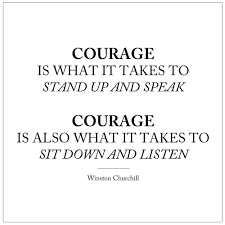Influence Into Legacy!
There is an Afghan proverb which says, “If you think you’re leading and no one is following you, then you’re only taking a walk.” I would substitute “leading” with “influence” and say, “If you are not influencing others, you are not leading.” Do you have influence? Furthermore, do you have influence over those you are leading? Sometimes that is hard to quantify.

As a father and as I served as a leader of an organization, I experienced a couple of challenges that affected my scope of influence. First, the day to day grind didn’t lend itself to my finding and understanding my direction or scope of influence. I often felt like I had no influence at all. Second, I had a bad habit of speaking before thinking. There were occasions where I reacted to comments I should not have reacted to. I recall specific organizational meetings where I said things I should not have said, and had I taken time to think, I likely would not have said them.
Influence can be both indirect or direct. According to Merriam-Webster’s dictionary, indirect influence is “the power or capacity of causing an effect in indirect or intangible ways: sway.” Influence can sway people one way or the other. The second definition states that influence effects people through “the act or power of producing an effect without apparent exertion of force or direct exercise of command.” I would venture to say that this could be done by using a position or title to influence individuals.
Character is demonstrated in how you respond to criticism and how you handle yourself in adversity.
One example of influence not being an influence at all is reflected in the stories on social media of people seeking free accommodations from resort owners for merely taking sensational photos of the resort properties, posting them on social media and receiving many “likes” (perceived influence). These people think their “influence” is attracting business for the resort owners and request compensation. Of course, as one article put it, there was pushback from a resort owner who did not give in to the requests for free accommodations just because the person had a media following. The article appeared here.
Here are 5 ways I feel you can exemplify your influence.
- Through your character – Everyday there are situations where your character will be tested. Character is demonstrated in how you respond to criticism and how you handle yourself in adversity, as discussed two weeks ago (read the blog here). Remember my poor reaction in my organizational meetings, my reactions in those meetings were a detriment to my character.
- Building trust – David Horsager state in his book, The Trust Edge: How Top Leaders Gain Faster Results, Deeper Relationships, and a Stronger Bottom Line , “Trust is the natural result of thousands of tiny actions, words, thoughts, and intentions. It doesn’t happen by accident, nor does it happen all at once. Gaining trust is work.” (p. 46) Every day make the effort to do the work of building trust.
- Being consistent – Last week I used the example of Henry Ford in building the Model T car (check out last week’s blog here). He used a system which built a consistent product that performed consistently. As leaders of businesses or even as you lead your family, consistency is exemplified in how you interact with your team and how you perform. Your legacy is dependent on your consistency!
- Being yourself – As you enjoy your work, it should come out in your personality and how you interact with the staff. As you go up the ladder of success, there is a challenge to isolate yourself. This challenge can build distrust and resentment. Going back to my second point, this takes time but is well worth the effort.

- Listening – Winston Churchill said this about courage, “Courage is what it takes to stand up and speak. Courage is also what it takes to sit down and listen.” As leaders and influencers, it is important to be humble and to stop and listen to others. Be humble enough to know that you might be wrong.
The beauty of time is of great value to me as I look back and see that even in the mistakes, I can still have influence. After realizing that my response in that meeting was not helpful, I humbled myself, went back to the individual that I did not react properly to and apologized. Others saw how I responded with humility, that I understood my mistake, and apologized. This act, as I was later to understand, had a huge impact, and my influence through that event grew.
Which one of the 5 areas of exemplifying influence has been the most challenging for you?